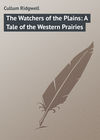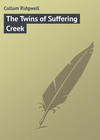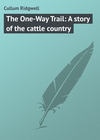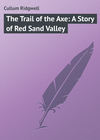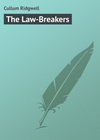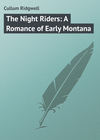Loe raamatut: «The Watchers of the Plains: A Tale of the Western Prairies», lehekülg 15
CHAPTER XXVI
THE SUN-DANCE
The pale moon shone down upon a strange scene.
Four great fires marked the limits of a wide clearing. And these were set with consummate accuracy at the cardinal points. Superstition demanded this setting.
The ruddy glow threw into uncertain relief the faces and unkempt figures of a vast concourse of men and women gathered, in one great circle, within the boundary limits of the fires. On the faces of all was an expression of fierce revelry. A dark setting completed the picture. Beyond the fires all was shadow, profound, ghostly. The woods in all directions closed in that weird concourse of beings, and even the devilish light of the fires could not relieve the savagery of the scene.
Like the hub of a gigantic wheel, in the midst of the circle stood a cluster of leafless trees, mighty patriarchs, gnarled and twisted, with great overhanging limbs as stout and rugged as only hoary age can make them.
The clearing inside the human circle was empty for a time, but the crowd without was momentarily increasing, augmented by an incessant stream of dusky, silent figures pouring from the adjacent forest depths. As the minutes wore on the human tide slackened; it became broken, finally it ceased altogether. Men, women and children, all the able-bodied inhabitants of the Rosebud Reservation had foregathered, and the significance of the gathering could not be mistaken.
Now a distant murmur comes from out of the blackness of the woods. At first it is low, faint, and without character. But it grows, it gains in power till its raucous din breaks upon the waiting multitude, and immediately a responsive murmur rises from ten thousand voices. Those who hear know the meaning of the discordant noise. The “med’cine” men of the tribe are approaching, chanting airs which accord with their “med’cine,” and serve at the same time to herald the coming of the great Sioux chief, Little Black Fox.
Nearer and nearer, louder and louder. All eyes are upon the black fringe of the forest where the trees no longer have power to obstruct the moonlight. And of a sudden a number of writhing, twisting figures come dancing into view.
They draw nearer to the expectant throng. Necks are craned, eyes are straining to watch the antics so significant to these creatures of superstition. For have not these strange beings power to invoke the spirits, to drive away evil influence from the path of him whose approach they herald?
They reach the clearing; they leap within the human circle. Their painted faces are distorted with the effort of their wild exertions; their befeathered heads are rendered still more hideous by the lurid blending of conflicting lights. Thirty creatures, hardly recognizable as human beings, dance to the accompaniment of a strange crooning of the women onlookers; to the beating of sad-toned drums, and the harsh scraping of stringed instruments. But the dance is marked by a distinct time. It has unmistakable features and figures, and it proceeds to its natural finish which leaves the dancers prostrate upon the ground, with their faces pressed hard into the dusty earth. It is a wild scene.
But the Sun-dance has only begun. There is much to follow.
Now a single figure moves out of the crowd, and takes its position in the arena. It is the young chief. His attitude is one of sublime dignity. His erect figure and haughty carriage bear the indelible stamp of his illustrious forbears. Silently he raises one hand, and a deathly hush falls upon his people.
And Little Black Fox speaks.
Tall, handsome, lithe, a frame of great bone and smooth sinewy muscle, he is an imposing figure. He wears no blanket, just the buckskin, beaded as becomes his high rank.
He harangues mightily, now working himself into an almost uncontrolled fury, again letting his voice die down to that plaintive, musical note which alone belongs to the Sioux tongue. And his speech is of war – wild, fierce, unreasonable war, such as his people love. He is thrilling with the untamed spirit of his ancestors, and every word he utters carries a ready conviction to the untutored souls to whom it is addressed.
He sweeps on in a torrential flow of passion, and those who listen are roused at once to a savage enthusiasm. There are no interruptions. The oration is received in complete silence. These are Indians taken into their sovereign’s council; they are there to hear while the young brave pronounces, with all the fire of his ardent, aboriginal nature, the doom of their white masters.
The wise men of the council are grouped together and sit aloof. They sit like mummies, smoking, and with every appearance of indifference. But their ears are wide open. One alone displays interest, and it is noticeable that he is different from all the rest of the aged group. He is younger. He has blue eyes and fair hair, and his skin is pale. Yet he, too, is blanketed like his companions. He listens acutely to the end of the speech. Then he silently moves away, and, unheeded, becomes lost in the adjacent woods.
As the chieftain’s last words die away the men of “med’cine” rise from their groveling attitude and a fresh dance begins. But this time it is not confined to the clearing. It is one which launches them into the midst of the audience. Hither and thither they caper, and from their tracks emerge a number of very young men. It might be that this is the “Dance of Selection,” for it undoubtedly has the result of bringing forth a number of striplings from the ranks of the onlookers.
The dancers have made the complete circuit, and about one hundred young men, little more than boys, join in the great Sun-dance.
Now ensues one of the most terrible scenes of human barbarity conceivable. In the course of the dance the “med’cine” men seize upon each of the willing victims in turn. On the breast of each boy incisions are made with long, keen knives; two parallel incisions on each side of the chest. The flesh between each two of these is then literally torn from the underlying tissues, and a rough stick is thrust through the gaping wounds. So the would-be brave is spitted.
Now a rawhide rope is attached to the centre of the stick, the end of it is thrown over the gnarled limb of one of the trees in the centre of the clearing, and the youth is lifted from the ground and remains suspended, the whole weight of his body borne by the two straps of bloody flesh cut from his chest.
The dance proceeds until each youth is spitted and suspended from the central cluster of trees, then, with one accord, the men of the audience break from their places and join in the war-dance. They dance about the victims with a fierce glee like hundreds of fiends; they beat them, they slash them with knives, they thrust lighted brands upon the fresh young flesh till it blisters and throws out nauseous odors. Their acts are acts of diabolical torture, inconceivably savage. But the worst agony is endured in desperate silence by each victim. That is, by all but one.
Out of all the number hanging like dead men upon the trees only one youth finds the torture unendurable.
He cries aloud for mercy, and his shrieks rise high above the pandemonium going on about him.
Instantly he is cut down, the stick is removed from his body, and he is driven from the ceremony by the waiting squaws, amidst a storm of feminine vituperation. He is the only one whose heart is faint. He will never be permitted to fight. He must live with the squaws all his days. He is considered a squaw-man, the greatest indignity that can be put upon him.
Thus are the braves made.
While the Sun-dance was still at its height two men who had taken no part in it, except that of secret spectators, moved quickly and silently away through the forest. Their gait was almost a flight, but not of fear.
Ten minutes of half running and half walking brought them to a spot where two horses were tethered under the guardianship of the fierce General. Here they mounted, and, without a word, proceeded with all speed in the direction of the Agency.
At the door they halted, and Seth spoke for the first time since leaving the Sun-dance. Parker had already dismounted, but the other remained in his saddle.
“Say, you’ll move right off,” he said quickly, “an’ git Hargreaves an’ his wimminfolk clear, too. Guess you’ll make the farm ’fore me, sure. Take the bridge for it. Rosebud ’ll let you in. Guess you’ll find plenty o’ company ’fore daylight. Rosie ’ll see to the signals.”
“Yes,” Parker nodded. “They’re moving to-night. This is a carefully planned surprise.”
Seth glanced at the eastern sky.
“Four hours to daylight,” he mused. Then: “Yes, guess there’s more’n Black Fox’s hand in this. So long.”
He rode off with his faithful dog at his heels, making for the ford, and watchful of every shadow as he went. His night’s work was yet only half done.
Crossing the river he climbed the opposite bank and rode out upon the prairie. Making a wide detour he came to within a hundred yards of the front of Nevil Steyne’s hut. Here he halted and dismounted. Crouching upon the ground he scanned the sky-line carefully in every direction. At last he seemed satisfied, and, flinging his bridle reins to the dog, who promptly took them in his powerful jaws and quietly sat down in front of the horse’s head, moved cautiously forward.
In a few moments he came upon two horses standing asleep, tethered by long ropes to picket-pins. One of these he released and led back to his own. Then he remounted and rode on. Again he circled wide of his destination, and this time struck into the woods that lined the river. His way now lay down the black aisles of tree trunks which he pursued until he came to a spot he was evidently in search of. Then he again dismounted, and, entrusting the two horses to the dog’s care, moved forward on foot.
With unerring judgment he broke cover directly in rear of Nevil’s log hut. There was neither window nor door on this side, a fact which he was evidently aware of, for, without hesitation, but with movements as silent as any Indian, he crept round to the front, and sidled to the window. Here there was a light shining dully, but no means of obtaining a view of the interior. He moved on, and, crouching at the doorway, listened intently. A few seconds satisfied him. Wanaha was inside; she was awake, for he heard her moving about. He knew at once that Nevil was out.
With a satisfied sigh he moved away. This time he walked eastward toward the bridge, keeping close in the shadow of the woods. A couple of hundred yards from the hut he stopped and took up a position just within the shelter of the undergrowth, whence he had a perfect view of the open plain in front, and yet was sufficiently sheltered by the echoing woods to hear the least movement of any one passing that way. And so he waited.
Nor did he wait long. Eyes and ears trained to this sort of work were kept ever on the alert. But it was his ears which told him at last of some one approaching. Some one was moving through the woods. The sound was faint and distant, but he heard it. There was no mistake. And he knew it was Nevil Steyne returning home.
Clearing the brush he made his way into the midst of the aisles of leafless tree-trunks. Pausing in the shadow of one of the forest giants he waited. The footsteps came nearer. He shifted his position again; for his ears told him that he was not yet on the track which Nevil would take.
At last, however, he came to a stand, and did not move again. Guided by a wonderful hearing, he knew that he was in a direct line between the man approaching and his home.
He leant against a tree, his eyes and ears straining. Some few yards away there was a shaft of moonlight stretching right across the path which Nevil must take, and on this path Seth kept his eyes.
The man came on all unconscious of who and what was awaiting him. He had no thought of his presence at the Sun-dance having been detected. His thoughts were on what the morrow was to bring forth; on what it would mean to him when Rosebud was removed from his path. She alone stood between him and that which he had schemed for ever since the arrival of the memorable letter from his brother. He was in a mood of intense satisfaction. He knew that at last he was to realize his desires, that at last he was to pay off a long score which he owed Seth of White River Farm.
He stepped into the moonlit patch. The sudden flash of light made him pause. It startled him. He looked beyond apprehensively, then he looked up, and the great moon above reassured him. He moved on. The next moment he stopped dead. He could proceed no further. A ring of metal was pressing against his forehead, and Seth was behind it, and his smooth, even voice, coldly compelling, held him.
“Say, I’ve been lookin’ fer you,” it said. “You’re comin’ right up to the farm. The Injuns are out. Savee? Jest fer once you’re goin’ to work on our side. Say, you’re goin’ to fight ’em – with us.”
There was a deathly silence. Neither moved. The gun was pressing the man’s forehead still. Nevil stood like one paralyzed.
“Wal?” questioned the cold voice, proceeding from Seth’s shadowy figure.
And Nevil was driven to speech.
“I’m not a fighting man. I – ”
But his denial was cut short.
“You’ve jest got ten seconds to make up your mind. You’re goin’ to fight – for us, or – ”
Seth had in no way raised his tones from the cold level of his manner at the beginning. His victim had only a shadowy impression of him. He saw only a hazy outline in the blackness of the forest; and he needed no further sight to convince him. There was sufficient in the tone, and in the pressure of the gun at his head. He knew the rest. Here was a sudden collapse of all his schemes. There could be no resistance. Seth had the drop on him.
“I’ll go,” he said sullenly.
CHAPTER XXVII
IN DESPERATE PLIGHT
At daylight the truth was known. The greatest Indian rising of two decades had begun.
The Bad-Lands had entered upon a period of slaughter, of wanton massacre, which was to form one of the bloodiest pages in the history of Indian warfare.
The first to realize the full terror of the situation were the troops in the small trader’s fort overlooking the Reservations. They awoke to find themselves hemmed in by a vast army of red-skinned warriors, entirely cut off from the outside world. The climax of their discovery was reached when an attempt was made to dispatch a telegraphic message to headquarters. The wire was cut.
The next to grasp the situation were the citizens of Beacon Crossing. The railroad track was destroyed, and all telegraphic communication was cut off. A horde of warriors from Pine Ridge Reservation, some thousands strong, threatened the township from the east, thus cutting them off from the settlers on the plains.
The full knowledge of these things came in driblets to the refugees gathering at White River Farm, filtering through piece by piece as each party came in. But as yet not an Indian had shown himself in the vicinity of the farm. Already twelve families had sought the shelter of Rube’s stockade. And all was in readiness for the siege.
The morning passed, and still two families lying farther out than all the others had not yet arrived. It was an anxious waiting.
It was three o’clock in the afternoon when at last one of the missing parties appeared on the horizon. It was at once seen that the two vehicles were being driven at a desperate pace. They were approaching from the north, and even at that distance the lookout could see the drivers flogging their horses into a furious gallop.
Seth passed the order to stand by. The defenders responded, and the stockade immediately bristled with rifles.
The wagons came on. Then suddenly a small party of Indians appeared over the horizon, racing in hot pursuit. But evidently the view of the farm altered their plans, for they reined in, halted, and, a moment later, wheeling about, vanished whence they came.
Seth, watching from the top of the stockade, realized something of the significance of their movements. And far graver fears than the manœuvre seemed to warrant assailed him.
The late arrivals brought further bad tidings. The Indians on the Cheyenne River Reservation were out, and working in concert with the others. It is a bad business when Indian tribes band together against a common foe. There was consternation among the women when they heard the news. The men smiled grimly, but there was no lightness in their hearts.
The time of waiting dragged wearily. Every one within the stockade felt the suspense to be far worse than the fiercest fighting. The intangible threat of this unnatural calm was dreadful. Still, the respite was not without its uses. Defences were strengthened with earthworks hastily thrown up on the inside of the stockade, and the upper rooms of the house were made ready for a selected firing party, whilst the women made every preparation for the comfort of their men.
Nevil Steyne moved about bearing his share in the labors. He was morosely silent, and his presence caused much speculation amongst those who knew nothing of what had happened on the previous night. Seth’s replies when questioned on the subject were evasive. Rube and Parker were no wiser than the rest, except that Seth had told them that Nevil was his prisoner, and must on no account be allowed to escape.
The gray spring twilight had settled over the plains. Still the last family, Joe Smith and his belongings, had not come in. Seth intended to give them their chance up to the very last, before he finally closed the gates. As the sun dropped he dispatched four mounted men to act as vedettes. They took up their positions a mile out from the farm, with orders to fire two shots in quick succession on sight of any Indians, and then to ride in with all speed.
After delivering his instructions he took up his position upon the stockade and watched them go. He was very anxious for the safety of Joe Smith; his place was nearly ten miles out, and away to the northeast. He knew that if the northern Indians were out it was quite possible that the old man had been cut off.
Now, as the day drew to a close, something of the gloomy prospect before them all seemed to have entered his soul. He was no alarmist, but he knew only too well the meaning of a big general Indian rising. The horrors he had witnessed in his early days were strong upon him, and the presence of all these white women under his charge weighed sorely. Nor did he glean much satisfaction from the thought that, at least, should disaster fall upon them he still had power to punish the man whom he knew to be the author of all this trouble. It would be poor consolation.
The darkness was growing. Now the reflection of Indian fires could be seen in almost every direction. There seemed to be a perfect ring of them, in the distance, around the farm.
He was disturbed in his gloomy reverie by the sound of some one scrambling up the newly-made earthworks to his side. It was Rosebud.
She took her seat at his side in silence. She was clad in her old prairie riding-habit of canvas, strong and rough, and eminently suited to the present condition of things. They had hardly met since the first alarm, so busy had everybody been. But now that all was ready the final lull before the breaking of the storm had provided even the busiest with leisure. The girl’s first words came abruptly, and displayed her wonderful faith in the man to whom they all looked for help and protection.
“Shall we pull through, Seth?” she asked.
“Can’t say, Rosie.”
The man’s reply was spoken slowly.
“Poor auntie!” Rosebud went on. “I can’t help thinking of her. I wish I’d never said anything about ’scalping’ to her. But she’s very good and brave. She hasn’t complained, and she’s worked as hard as anybody. Do you know, I believe, now she’s got over the first shock of it, she rather enjoys it. What do you think she said to me half an hour ago? She said, with such a smile, ‘When I get home I shall have something to tell them. I’m keeping a diary.’ Like a fool I said, ‘You aren’t home yet, auntie.’ I said it without thinking. What do you suppose she replied?”
“Can’t guess.”
“Oh, I’ll get home all right. Mr. Seth ’ll see to that.”
But Seth was impervious to the compliment. The girl smilingly watched his sombre face out of the corners of her eyes. There was no responsive smile.
“It’s jest them things make it hard,” he said, with something very like a sigh.
Rosebud’s face had become serious. Her thoughts were hard at work.
“Is it as bad as that?” she asked presently.
“’Tain’t no use lookin’ at it easy. We’re facin’ the music – hard – this time. But we ain’t done yet. Not by a sight. It’s kind o’ lucky we’ve laid in a big store of ammunition an’ things.”
It was dark by now, except for the glow of Indian fires, which gave a weird light on all sides.
Rosebud drew closer to the man’s side. Her action passed unnoticed. His eyes were intent upon the dark horizon. He was watching, watching, with every faculty alert. He was listening, his ears ready to catch the faintest sound.
“It would be all right if only they could have sent word to the headquarters of the troops, I s’pose,” the girl said thoughtfully. “Just fancy the Indians cutting the telegraph wires and destroying the railway.”
“Yup. Guess they’ve had all winter to get things settled,” Seth responded indifferently, while he turned a keen ear to windward.
“What are you listening for?” asked Rosebud, quickly.
“General’s out scoutin’.”
“Good old General!”
“Yes, he’ll locate the Injuns when they git around.”
But just then Rosebud was thinking of other things.
“Why can’t you find some one who will try to get through to the troops? I mean the headquarters?”
Seth shook his head.
“Can’t spare a single man,” he said conclusively. “I ’lows no white folk ’ud get through anyways. An’ we ain’t got an Injun, an’ if we had I wouldn’t trust him no more’n I’d trust a ’rattler.’ No, Rosie, gal, we’ve got to fight this out on our own. An’ make no sort o’ mistake we’re goin’ to fight good an’ hard. I’ve figgered to hold this place fer two weeks an’ more. That’s how I’ve figgered.”
It was the final repetition which filled Rosebud with misgivings. She realized the man’s doubt. Suddenly she slipped a hand through his arm, and it gently closed over one of his. Her soft eyes were raised to his face as she put another question in a low tone.
“And if we go under, Seth?”
The man moved uneasily, but the little hand retained its hold of his.
“What then?”
Seth cleared his throat, but remained silent.
“What then?” the girl persisted.
“Don’t ask me.”
“I’ve thought once or twice of my poor father and mother,” Rosebud said presently. “I was wondering what happened to them at – at the end.”
Seth eyed the girl for a second. His face was troubled.
“I’ve a notion he was killed by the Injuns,” he said.
“And mother?”
“Can’t jest say. I don’t fancy, though, he let the brutes worrit her any.”
There was another pause. With an involuntary movement Rosebud’s hand tightened trustfully upon his.
“I think father was right – to do that,” she said simply.
The man nodded.
The next moment he was kneeling, his body bending forward, and his eyes straining in the direction of the horizon.
“What is it?” the girl asked.
“Ther’s something movin’.”
But Rosebud could hear nothing. Still she was content to accept his assurance.
“It’s wheels,” he said after a few moments.
“Is it Joe Smith’s outfit?”
“Yup.”
They both listened. The girl could now hear the faintest possible rattle of wheels. Suddenly she turned upon him. Her breath was coming quickly. She was smiling, and her eyes were soft under cover of the dim starlight.
“Seth, I want you to let me do something. In the old days you used to be my dear old ’daddy.’ You used to scold me when I did wrong. You used to get angry with me, and I used to get more angry with you. Since I’ve grown up, of course, things have changed, haven’t they?”
“Yes.” The man looked into her face wonderingly.
“Well, daddy dear,” the girl laughed nervously. “Maybe when the trouble begins I shan’t see much of you. You’ll be busy, and so will I. It’s peace now, and I just want you to fall back into the old way. I want you for my ‘daddy’ – my dear, dear old ‘daddy’ – just for these few minutes. I want to be the silly scatterbrain I used to be.”
“I ain’t a heap at guessin’, Rosie,” Seth said doubtfully, but smiling tenderly at the upturned face.
“No, you never were.” Rosebud gave a queer little laugh. “Well, I just want you to let me ride out and meet dear old Mrs. Smith. You know what a nervous old dear she is. I just thought if I rode out it might brighten her up. You see, she’d think the danger less, if a woman came to meet her.”
“Wal, I won’t say you no, gal,” Seth replied gravely. “Guess it ain’t right. But ther’ ain’t a heap of danger. Y’ see in them old days I most gener’ly let you do as you notioned,” he finished up with a shadowy smile.
“Dear old daddy!” Rosebud squeezed his arm with both her hands.
“Ther’ be off, an’ git your plug saddled, or mebbe I’ll change my mind.” The man could stand the temptation no longer. He gently released himself, and the girl moved as though to descend. But she altered her mind. Fortunately neither could see the other’s face distinctly.
“Seth,” she said, with forced brightness, “in the old days when I asked your permission for anything and you gave it to me you – you didn’t let me go like that. It was customary for me to show my gratitude – like – like this.”
She suddenly leant forward and imprinted a swift kiss on the man’s thin cheek. And before he could reply, or even move, she had clambered down from the wall and made off. Nor was it until he heard her horse galloping out of the stockade, which occurred suspiciously soon after her leaving him, that he became aware that his cheek was wet with tears that had not been of his shedding.
